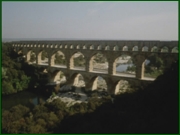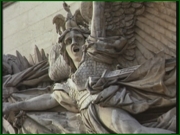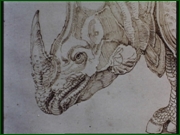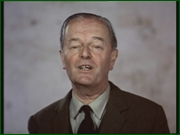Civilisation: A Personal View by Lord Clark (1969) 4 x DVD The Complete Series
on February 27th, 2016 at 06:16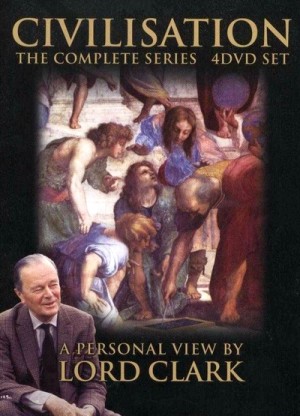
The eminent art historian Sir Kenneth Clark was commissioned to write and present an epic examination of Western European culture, defining what he considered to be the crucial phases of its development. Civilisation: A Personal View by Lord Clark would be more than two years in the making, with filming in over 100 locations across 13 countries.
The ideological center of Civilisation can be summed up in two words, the very words which form the title of the thirteenth and final episode: heroic materialism. Kenneth Clark, eminent British art professor, takes the approach of most mainstream thinkers of his time, that history is guided by great individuals, and their accomplishments can be marked by the products they made. Civilisation is not so much a survey of great ideas. It is a survey of great stuff. Monumental architecture, powerful statuary, profound art, clever inventions—these are the artifacts that prove the triumph of western culture.
3 x DVD9 + DVD5 | PAL 4:3 | 13 x 50mins | 23.9 Gb + 3% rec
Language: English
Subtitles: English
Genre: Documentary, History, Music, War

Civilisation consists of 13 hour-long episodes, taking a historical approach to art by tracking the ups and downs of European history.
• "The Skin of Our Teeth:" Clark begins with a quote from Ruskin that validates the view that civilization can only be truly understood by studying art. He implies civilization is about to be overrun by barbarians, so he offers to start the journey with a look at the last total collapse of reason and culture: when the barbarians destroyed the glory of Rome, then swept through Europe to threaten all the great accomplishments of good Christians. Fortunately, Charlemagne, "the first great man to emerge from the darkness," saved us all.
• "The Great Thaw:" There is a sequence in EPCOT's "Spaceship Earth" ride where we see (and smell) the burning of Rome and then pass through a scene of monks quietly toiling away copying books. (There is also a facing scene of Islamic scholars, but don't look for Civilisation to talk much about that.) One monk is napping at his desk, an ecclesiastical Rip Van Winkle who is awaiting the bright dawn of the Renaissance around the next corner of the ride. Yes, the second episode of Civilisation is about the struggle to overcome that "Dark Age" during which nothing apparently happened in the world (world meaning Europe, of course). Watch our "leap forward" from ignorance to artistic enlightenment, embodied by cathedrals. Big, heavily decorated cathedrals.
• "Romance and Reality:" The parade of heroic figures keeps coming. Religion is represented by St. Francis of Assisi; the arts are advanced by Giotto and Dante. Clark follows the development of "the gothic imagination." Now that the courtly love tradition begins to enter art, Clark also finally starts talking about women, at least as embodiments of abstract ideas like, say, Chastity and Nature. He seems to find placing women at the center of things a touch absurd and courtly love poetry "unreadable." Even Dante (who paid so much honor to his Beatrice) is a little suspect in Clark's eyes.
• "Man: The Measure of All Things:" Now that we have devoted some time to those bothersome females, we are back to talking about what counts. Yes, men. Even better, artistic men. Clark takes a look at the Renaissance, where, in his effort to say something new about a picked-over subject, his sense of humor really comes to the fore.
• "The Hero As Artist:" Here are the heavyweight contenders in Clark's survey of art history: Raphael, Michelangelo, and Leonardo. In 1969, getting to see color footage of the work of these artists was a new experience for homebound British audiences. Now, you have probably seen this stuff a million times. And no, before you ask, no secret Da Vinci codes revealed here.
• "Protest and Communication:" Clark finally focuses on a group of thinkers known more for their words. Erasmus, Luther, and Shakespeare reshaped written language and reflected the radical intellectual shift of their age. Still, we spend more time looking at pictures of them than learning the details of their ideas or listening to their words. We do get to see some Shakespeare performed by the likes of Ian Richardson and Patrick Stewart.
• "Grandeur and Obedience:" The Counter-Reformation provided the Catholic Church an opportunity to produce—guess what—more opulent art. Michelangelo (again!), Caravaggio, and Bernini rose to the task, and their work led to the Baroque.
• "The Light of Experience:" The power of the Church gives way to the power of Reason, epitomized by thinkers like Descartes and realistic painters of the rising middle class like Rembrandt and Vermeer. And don't forget the rise of trading empires like Holland.
• "The Pursuit of Happiness:" Although every episode is backed by period music, this is also the first time that Clark calls attention to the connection between architectural harmony and the structure of music, particular as this is the age of Bach and Mozart.
• "The Smile of Reason:" Welcome to the Enlightenment, seen through the windows of Versailles and Monticello and the words of Voltaire and Jefferson. Science, wit, and intellect were prized above all. Once again, though, we see more about the places where people like Voltaire wrote than actually hear any of the words of Voltaire that changed thought in Europe.
• "The Worship of Nature:" Time to take off your shoes and run in the grass. Romanticism reigns. From Rousseau's view of "natural man" to the paintings of Constable and Turner, with a detour to actually quote the Marquis de Sade, we see how nature inspired a generation.
• "The Fallacies of Hope:" The reason of the Enlightenment reaches its apotheosis in the impulsive utopian visions of Napoleon, Beethoven, and Byron. Oh, as Wordsworth said, "to be young was very heaven." But soon, the revolutions would give way to disillusion and cynicism.
• "Heroic Materialism:" Don't expect anything about Twentieth Century art in this series. Clark does not even pretend to understand or respect anything after 1900, but he has plenty to say about the end of the Nineteenth Century which led to the grim modern era that seems to mark the end of civilization for him. He does see hope in a history of humanitarianism, "the great achievement of the Nineteenth Century".
Extras:
• Sir David Attenborough remembers the making of Civilisation
• Photo gallery of behind-the-scenes stills
Civilisation.1969.U.D1.part1.rar
Civilisation.1969.U.D1.part2.rar
Civilisation.1969.U.D1.part3.rar
Civilisation.1969.U.D1.part4.rar
Civilisation.1969.U.D2.part1.rar
Civilisation.1969.U.D2.part2.rar
Civilisation.1969.U.D2.part3.rar
Civilisation.1969.U.D2.part4.rar
Civilisation.1969.U.D3.part1.rar
Civilisation.1969.U.D3.part2.rar
Civilisation.1969.U.D3.part3.rar
Civilisation.1969.U.D3.part4.rar
Civilisation.1969.U.D4.part1.rar
Civilisation.1969.U.D4.part2.rar

